The Mike Grell Dragon*Con Panel
By Philip Schweier
October 13, 2011 - 09:53
As a young man growing up in northern Wisconsin,
future comic book artist Mike Grell had initially intended to become a
lumberjack, like his father. “When I was 16,” he told an audience at a recent
convention, “he got me a job working in the woods and thank God he did because
I found out how hard the old boy had been working all those years.”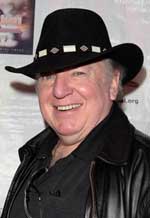
Writer/Artist Mike Grell
Grell then made plans to become an architect, but the math proved too great a
hurdle and he switched to commercial art instead. “When I was in the Air Force,
I met a guy in basic training by the name of Bailey Phelps, who said, ‘Give up
this commercial art thing, you should become a cartoonist, because cartoonists
only work two or three days a week and make a million dollars a year.’”
That might have been true for the likes of Peanuts
creator Charles Schulz, but Grell said, “After 39 years in the business now,
someone owes me $38.5 million bucks and about 30 years vacation time.”
The thought of getting into comics never occurred to him until he was stationed
in Saigon, when another airman showed up with a bundle of old comics in tow.
“He had Daredevil by Gene Colan and Tom Palmer, and he had Denny
O’Neil/Neal Adams/Dick Giordano’s Green Lantern/Green Arrow. And I
took one look and thought, ‘I know exactly what I want to be when I grow up –
Neal Adams.’”
After serving an apprenticeship with Dale Messick on her newspaper strip Brenda Starr, Grell chanced into a
meeting at a comic book convention with artist Irv Novick, who was working for
DC Comics at the time drawing such characters as Batman and the Flash. He
encouraged Grell to submit his work to Julie Schwartz. After a few jobs drawing
Aquaman back-up stories, he was able to establish a large body of work.
“I took every assignment that came my way. If I hadn’t slept for days and
somebody said, ‘We need a seven-page story done over the weekend,’ I’d take it,
and find some way to stay awake and get the thing done.”
Fate intervened when a dispute led Dave Cockrum, who was drawing
the Legion of Super-Heroes at the time, to depart the book. His
last work on the title was #202, penciling a story entitled “Lost: A Million
Miles From Home.” Grell did the inks, then penciled and inked the following
issue himself.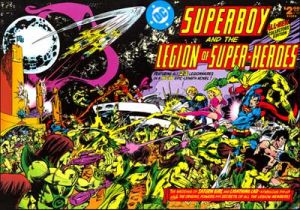
Grell's wrap-around cover to the Legion of Super-Heroes Limited Collector's Edition
After drawing the Legion for the next few years, he left the title when
presented the opportunity to write and draw his own character. “Because
of my interest in comic strips, I knew most of those guys – Hal Foster,
Milton Caniff – wrote all their own stuff,” he said. “And it sort of went hand
in hand. Like the bumblebee, I didn’t know I wasn’t supposed to fly. And my
first book on my own was of course the
Warlord.”
In 1975, the Warlord debuted in First Issue Special
#8, leading to an ongoing series which Grell wrote and/or drew for
approximately 80 issues. Many of the later ones were written by his then-wife,
Sharon Wright, a fact that went unnoticed by the readers at the time. When he
eventually left the series, he launched a new title entitled Starslayer
with Pacific Comics, one of the earliest so-called independent publishers that
sprang up in the early 1980s to offer creator ownership.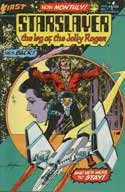
Starslayer #1
“I guess if I have to pick one thing out of my whole career to hang my hat on,
I think that’ll do,” he said. “It was tough going there at first, but man, once
people saw what could be done, it was amazing.
“We knew that this was going to break the lock. Pacific couldn’t really hold it
together but fortunately First Comics stepped up right behind. And I had a
sense then that this was going to be something that would change the industry
and it did. I guarantee you, if it hadn’t been for companies like Pacific and
First, Marvel and DC wouldn’t be paying royalties right now.”
Starslayer,
like the Warlord before, was a blend of science fiction and sword
& sorcery, moving Grell away from the costumed super-heroes he worked on
earlier in his career. Jon Sable: Freelance, published by
First Comics, took it further, featuring the adventures of a bounty
hunter/mercenary who masquerades as a children’s author, largely because the
money is better. The series ran for approximately 60 issues before Grell left,
returning once again to DC Comics to write and draw Green Arrow: The Longbow
Hunters, a three-issue mini-series that eventually led to an ongoing
series that he also wrote.
Again, Grell took steps to move into the real world, despite the character’s
background as “Batman with a bow.” He said, “I wanted to put Ollie into the
real world as much as possible, having just gone from the Sable series and drawing on real world stories for inspiration,
news stories and things like that.”
Grell credits his editor, Mike Gold, with whom he had worked at First before
Gold moved over to DC, for providing him with the opportunity. “Mike phoned me
up and asked me if there was something I’d like to do at DC enough to bury the
hatchet and come back to work over there. And I thought I had always done such
a crummy job on Batman that I’d love another shot at it except I knew that
Frank Miller had just started writing his new project which was coming out
around the same time entitled The Dark Knight.”
According to Grell, Gold said, “‘Well, what about Green Arrow?’ and
Green Arrow was always my favorite comic book character, and he said, ‘Think
about this: Green Arrow as an urban hunter.’ Oh, yeah, that works for me. I’ll
take that.” 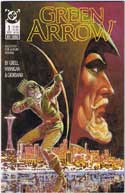
Green Arrow #1
After 80 issues, Grell left Green Arrow behind. Following a three-issue James
Bond story, his next project, for Image Comics, was Shaman’s Tears. “At
that point,” Grell said, “it was a decision to do a super-hero type oriented
book, but I really don’t care that much for super-powers. So I decided what I
really wanted to do was something that had more of a metaphysical or spiritual
aspect to it where the guy, the hero of the book, undergoes the ordeal of the
Sundance ceremony and is bestowed with the powers of the animals.” The series
ran for a total of 13 issues.
In the early 1990s, speculators had taken over the comic book market, resulting
in a lot of cheap gimmicks such as die-cut covers and events with no
significant lasting implications. When the bubble burst, many comic book
creators struggled, including Grell. It took a while, but eventually he landed
at Marvel Comics where he spent a brief time writing Iron Man.
He also published a novel based on his Sable series, and has since
revived the character for a couple of limited series published by IDW. The
character has also been optioned for film.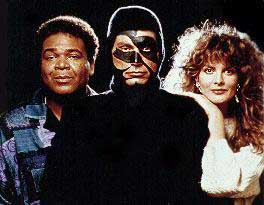
The cast of the short-lived Sable TV Series: Ken Page, Lewis Van Bergen and Rene Russo
In 1987, ABC broadcast six episodes based on the Sable character, but the show
failed to capture the attention of viewers. Since then, in 2001, Gene Simmons,
the bass player for KISS, has optioned the title.
“He was pushing to get it greenlit before the ides of March,” said Grell.
“March 15 was the cut-off that year because there was a Screen Actors Guild
strike pending and they knew that if SAG went out the first of July, anything
that was in production had to be finished.
“They were down to about the last 10 days and Stephen DeSouza, who had written
the script – he wrote Diehard and Commando
and tons of other stuff. So what they said was, ‘What we’re going to do instead
of rushing this is, we think it’s a better story than this, we’re going to take
a little more time and start shooting in October, shoot over Christmas in
Africa and New York.’ Great, that’s fine. And in September, the Towers came
down.”
The tragedy of 9/11 put a choke-hold on financing from overseas, as
well as many films featuring references to terrorism and violence. But since
then, Grell has been pushing to see the film made. “A year ago I was working
with a director and at the point where the lawyers got involved, everything
went to hell. Imagine that. My guy talked to his guy and they’re having a great
time. They’re showing the size of their various appendages and I honest-to-God
thought we were one e-mail exchange away from a signature and they said, ‘Screw
this,’ and pulled out. But, a year later, we’re back. Got the deal memo, waiting
for a phone call. We’ll see. Cross your fingers and toes.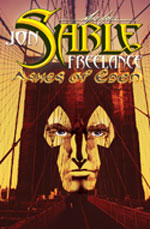
Mike Grell's recent Jon Sable graphic novel
Gradually Grell has made his way back into mainstream comics, most recently
writing and drawing a revived Warlord title for DC Comics.
“There’s a panel early in the original series,” said Grell, “where I planned
how I was going to kill him off, and I just did last year.” The run
culminated in the death of Travis Morgan, the title character and the mantle of
the Warlord being handed down to his grown son.
He has also been working with actor Mark Ryan on a series entitled The
Pilgrim. It tells the story of a program by the British during WW
II. “They were attempting to conjure up a physical form out of pure mental
energy with the idea that this could form the basis of the perfect clandestine agent.
You can manifest this person, this object, this whatever, anywhere you want,
send it on a mission, espionage, assassination, anything, and it vanishes into
nothing when you’re done with it. Except in the case of The Pilgrim, the house where this is going on gets bombed and this
thing escapes into the world.
“Then come forward in time and it’s a story about this creature, the Pilgrim,
who is formed out of the psyche of many different people – almost like the
Frankenstein monster. He doesn’t know what he’s supposed to be, what he’s
supposed to do. He has incredible powers, but he has no idea what they’re for
or why. And he spends all this time trying to learn how to be a human. He’s
succeeded to the extent that he’s sort of forgotten who he really is. And the
story is a zinger, and I’ll be honest with you, I’m not entirely sure how it
ends.”
So far, two issues have been published. “The Pilgrim, we’re talking to a
new publisher at the moment,” explained Grell.
In the meantime, Grell has returned to mainstream comics, illustrating such
titles as X-Men Forever and Herc for Marvel, and
a Green
Lantern/Green Arrow special at DC.
Related Articles:
Mike Grell Launches December Kickstarter
The Mike Grell Dragon*Con Panel
Baltimore Comic-Con 2011 Lines Up Adlard, Aaron, Grell, and Frenz
Ryan and Grell at Seattle Comicard Convention
Mike Grell on The Return of Jon Sable
